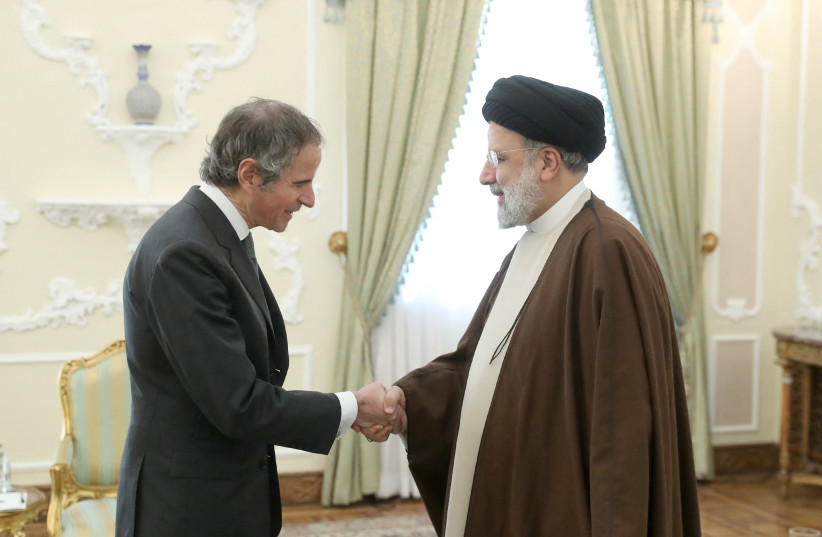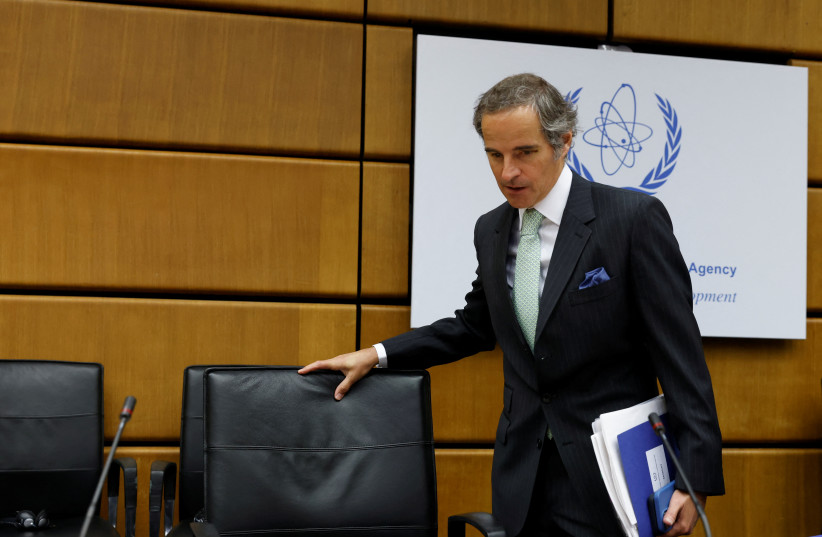by JPost editorial
Iranian enrichment is nearing a redline in terms of having a stockpile of uranium that could be used in a nuclear weapon.
 |
Iranian President Ebrahim Raisi shakes hands with International
Atomic Energy Agency (IAEA) Director General Rafael Grossi in Tehran,
Iran, March 4, 2023.
(photo credit: Iran's President Website/WANA (West Asia News Agency)/Handout via REUTERS)
|
The director-general of the International Atomic Energy Agency, Rafael Grossi, said this past weekend that an Israeli attack on Iran’s nuclear program would violate international law and was illegal. At the same time, the IAEA appears to offer few ways to stop Tehran’s race forward as it proceeds to enrich uranium and inches closer to a nuclear bomb.
Grossi’s statement led Prime Minister Benjamin Netanyahu to criticize him on Sunday and to affirm that Jerusalem will act against the Islamic Republic as it deems necessary, including through preemptive self-defense to avoid a nuclear threat.
“International law from the Geneva Protocols in 1949 and thereafter and several resolutions of the general conference of the IAEA: attacks on nuclear facilities are illegal, are a violation of the UN Charter. I did not say anything which should be considered departing from what is in the public domain. Maybe that got their attention,” the Argentinian diplomat turned IAEA director said when asked about Netanyahu’s response.
“International law from the Geneva Protocols in 1949 and thereafter and several resolutions of the general conference of the IAEA: attacks on nuclear facilities are illegal, are a violation of the UN Charter. I did not say anything which should be considered departing from what is in the public domain. Maybe that got their attention.”
Rafael Grossi
This creates a difficult situation, in which the world wants to consider an attack against Iran as being “illegal” even if it is aimed at preventing Tehran from becoming a threshold nuclear power and breaking out toward weaponization for its uranium. In essence, according to this line of thinking, it is only “legal” to wait until Iran develops, tests and launches a weapon to try and stop it. Israel is right to be concerned about such a situation, in which the world only offers words about Iran’s nuclear program, but no real action.
Iran continues to enrich uranium at levels slowly inching toward 90%. While the last reports said enrichment had reached 84%, the overall trend is clear. Iranian enrichment is nearing a redline in terms of having a stockpile of uranium that could be used in a nuclear weapon. This is a danger to the region and the world. Iranian-Russian cooperation, including the supply of drones to Russia, shows how Iran’s nefarious activities have a global footprint.

Tehran is paying lip service to claims it may enable better monitoring of its program by the IAEA but it remains to be seen if Iran will actually follow through. The IAEA and the Atomic Energy Organization of Iran issued a joint statement on the importance of “taking steps for broader cooperation in order to expedite the resolution of remaining safeguards in an appropriate manner.”
For those concerned about Iran’s enrichment and progress toward a possible weapon, this will offer few assurances, because so far there is nothing concrete to prevent Iran’s weaponization of its nuclear program. This is the key problem: Iran is enriching uranium and developing long-range missiles to carry a warhead.
Netanyahu is correct to ask the difficult questions on Iran
Netanyahu is right to ask tough questions about why Iran is able openly to seek Israel’s destruction and inch closer to a bomb. Tehran is involved in trafficking weapons to Iraq, Syria, Lebanon and Yemen and has also illegally targeted commercial ships in the Gulf of Oman. It has targeted US troops in Iraq and Syria, and the visit by US Secretary of Defense Lloyd Austin to the region this week underscores America’s commitment to these key areas that are threatened by the Islamic Republic.
Iran must be deterred from developing a nuclear weapon. The situation now is that it says one thing and does another, in terms of enrichment and the development of its missiles.
Israel and its partners abroad must be concerned about Iran’s advances as well as its other activities, such as the drone exports to Russia. As we continue to be wary of Iran’s potential weaponization of its nuclear program, we must expect more from the international community.
This means hearing not only why any potential act to stop Iran acquiring a nuclear weapon is unlawful, but also requires a clear message that its actions are unlawful and that the world will not tolerate a continue slide in Tehran toward breakout.
Currently, Iran appears to feel it can do whatever it wants without any repercussion. This is a destabilizing factor that raises tensions and endangers both the region and the world.
JPost editorial
Source: https://www.jpost.com/opinion/article-733899
No comments:
Post a Comment